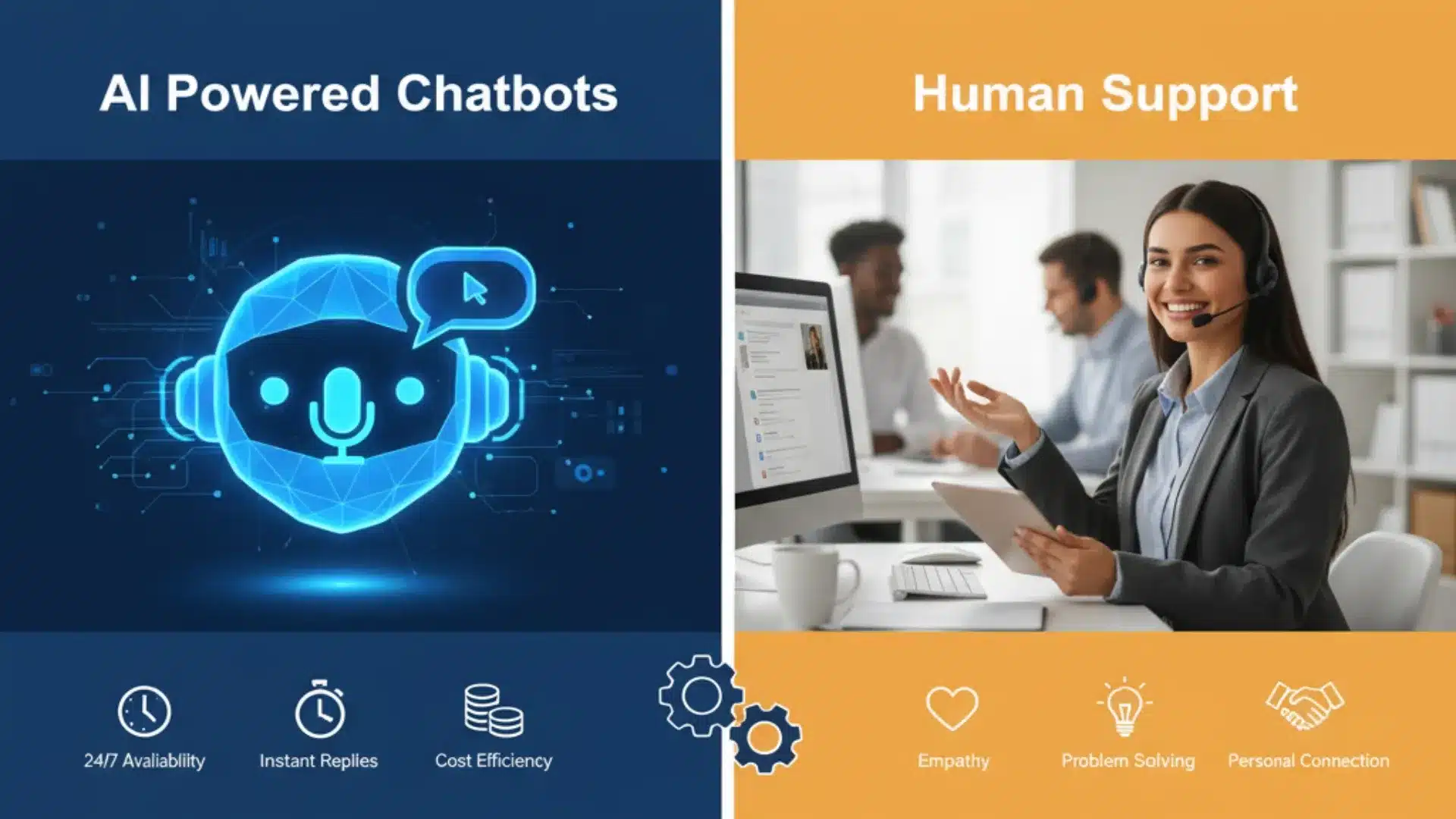AI Powered Chatbots vs. Human Support: Which Works Better?

AI Generated. Image Credit: Gemini
Table of Contents
- What Are AI-Powered Chatbots?
- What Is Human Support?
- AI-Powered Chatbots vs. Human Support: A Basic Comparison
- Strengths of AI-Powered Chatbots
- Weaknesses of AI-Powered Chatbots
- Strengths of Human Support
- Weaknesses of Human Support
- When to Use AI-Powered Chatbots
- When to Use Human Support
- The Power of a Hybrid Approach
- Real-World Example
- How to Choose the Right Mix
- Future of Customer Support
- Conclusion
Businesses are today striving to improve customer experience while keeping costs down. This is where AI-powered chatbots are transforming the game. These intelligent tools can handle thousands of questions in one go; however, they also pose an issue that is common: do they have the capability to substitute for human assistance?
Let’s look at how AI chatbots, as well as human agents, are compared to each other, the areas where each is superior and how businesses can manage both to get the most effective results.
What Are AI-Powered Chatbots?
AI-powered chatbots, which utilize AI and natural language processing to interact with users. They comprehend messages, seek answers, and respond with a human-like manner. You’ve likely seen them on apps or websites which greet you by saying “Hi! What can I do to help you today?”
In contrast to the basic bots, which depend on pre-set principles, AI chatbots can learn from data and handle more queries over time, and discern tone or intention. They are used to track orders and change passwords, to schedule appointments, and even to solve fundamental issues.
What Is Human Support?
Human support means live agents helping customers directly. Support teams listen, can understand and address problems that require Empathy and a sense of decision-making. When it comes to chat, phone or via email, human representatives can discern emotions and change tone and establish trust, something machines cannot match.
Human support plays a crucial part when users have to deal with complicated or challenging situations that require an individual’s judgment and attention.
AI-Powered Chatbots vs. Human Support: A Basic Comparison
Let’s take a look at how these two organizations handle important areas of customer care:
| Feature | AI-Powered Chatbots | Human Support |
|---|---|---|
| Availability | 24/7 non-stop support | The limit is based on working hours. |
| Response Time | Instant replies | Slower, depends on the queue |
| Consistency | Same answer each time | Agents may vary. |
| Empathy | There are no real emotions | Knows how to express emotions and the tone |
| Complexity Handling | Finds itself struggling with unique issues | Deals with emotional or complex problems with ease |
| Cost Efficiency | Low-cost scale | Higher cost per query |
| Learning Ability | Enhances the quality of life with information | Learns from the experience |
| Best Use Case | Basic or repeated questions | Complex or sensitive issues |
Custom AI Software Development Solution For Enterprises
Strengths of AI-Powered Chatbots
- 24/7 Accessibility: AI chatbots are never asleep. They’re always on the move to assist with queries, even after hours. This means that customers can get assistance whenever they require it.
- Instant Responses: Contrary to humans who can communicate with a single customer at the same time, chatbots can manage hundreds of chats at a time without waiting in line.
- Cost-savings: Chatbots can reduce costs for staffing by performing basic support tasks. Human agents can be employed by businesses only in cases that require personal attention.
- Quality and Consistency: Chatbots offer the exact same response each time, eliminating human mistakes or missing details.
- The ability to scale: It doesn’t matter if there are 10 or ten thousand customers; AI bots can scale quickly without slowing down or needing to hire more employees.
Weaknesses of AI-Powered Chatbots
- Limited understanding: Chatbots perform best when they have clear and concise inquiries. If a customer’s problem is unclear or emotionally charged, a bot may not be able to comprehend the issue.
- A lack of Empathy: The most sophisticated AI doesn’t display genuine concern. In times of stress or needing to be urgent, customers usually require a human touch.
- Dependence on data: Chatbots need to be taught using reliable data. If they are not updated regularly, they could give incorrect answers.
- gaps in the escalation process: In the event that chatbots don’t have a clearly defined route to connect users to live agents and vice versa, it could cause more irritation than aid.
Strengths of Human Support
- Human Empathy, Emotional Intelligence: Empathy and Emotional Intelligence beings are able to listen, detect emotions, and respond with compassion – a quality that AI cannot replace.
- Better Problem-Solving: The human mind can think creatively and discover solutions to complex or even bizarre issues.
- A personal conversation: The act of having a pleasant discussion helps build trust and loyalty. Customers feel appreciated when they are assisted by a person who truly cares about them.
- Handling sensitive issues: Complaints and billing disputes or sensitive topics are best handled by human beings who are able to calm and soothe users.
Weaknesses of Human Support
- Limited availability: Human beings aren’t able to work all day. This can cause downtime as customers aren’t able to get immediate assistance.
- More expensive: The hiring process and training, as well as managing support teams, are more costly than running chatbots.
- Non-concordant Qualities: The majority of agents have the same experience or approach, which could cause inconsistent customer experiences.
- A slower response time: During peak times, human agents are able to handle only a certain number of calls or chats, which can lead to delays.
When to Use AI-Powered Chatbots
AI chatbots are great for the following scenarios:
- You get frequently asked questions (like order status, password resets, or the return policy).
- You’d like to provide 24/7 assistance without adding to the number of employees.
- You deal with large volumes of inquiries and require immediate responses.
- You require quick, accurate solutions through integrated platforms.
For example, an online retailer can employ chatbots that can answer “Where’s my order?” instantly, whereas more complicated complaints are handled by human agents.
When to Use Human Support
Human support is the best when:
- The problem demands comprehension and compassion.
- The issue is several systems or distinct situations.
- The client is angered, upset and confused.
- The company wants to create strong relationships with its customers.
For instance, an unhappy customer complains about a delivery issue. An actual chat with an agent will restore trust much better than a fake message.
The Power of a Hybrid Approach
The best option doesn’t lie between AI and human beings, but combining both. A hybrid model integrates AI’s speed and human compassion.
Here’s how it is done:
- Step 1. Chatbots greet customers, respond to simple questions, or collect information.
- Step 2. When the question is complicated, the bot sends the conversation to a human agent with complete details.
- Step 3. Humans continue from the point where the bot stopped and solve the issue quickly.
The teamwork of the team ensures that customers always receive prompt and comprehensive support.
Real-World Example
Let’s consider a travel agency as an illustration.
Chatbots can provide answers to frequently asked questions, such as baggage policy or flight times. If a flight is cancelled, a live agent is called into action to process the refund or rebooking with respect and sensitivity.
This helps businesses reduce time and cut costs, as well as keep their customers satisfied, all at the same time.
How to Choose the Right Mix
To figure out the amount of AI and human assistance you require, think about these questions:
- What kind of questions are we most frequently asked?
- How complicated are these questions?
- Do customers expect personal interaction?
- What is our support budget? And what’s the team size?
Begin by letting chatbots deal with routine queries, then increase the remainder. Monitor satisfaction and feedback scores to improve your method of operation.
Future of Customer Support
AI technology is constantly improving. Chatbots of today are learning to understand emotions, detect intent more effectively, and even speak naturally.
In the future, we may see AI agents that feel more human-like, combining voice, text, and emotion recognition. Humans will still be crucial in ensuring trust, as well as creativity and connection to emotions.
AI can manage routine work while humans focus on the things that really matter.
Also read: Customer Service and Sales Potential with Custom AI Chatbots
Conclusion
Which is better, AI-powered chatbots or human assistance?
The answer will depend on your requirements. Chatbots can handle speed as well as scale and effectiveness. Human agents prevail in situations where empathy, knowledge and personal touch are the most critical factors.
The best results can be achieved when the two work in tandem. Bots can handle everyday tasks while humans handle more difficult ones. This combination keeps customers happy and companies productive.
Future customer care isn’t about replacing individuals. It’s about improving their capabilities by using more innovative tools. Partnering with a custom AI chatbot development Company will help you create an answer that meets your goals for business, increases the efficiency of support, and provides an easy customer experience.
Combining the best of two worlds, you can create a support system that is not just smart but also a human being at heart.









